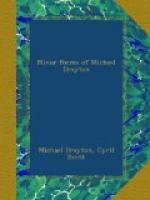In that I see you striue not to suppresse
Their barbarous malice; but your noble heart
Prepar’d to act so difficult a part,
With vnremoued constancie is still
The same it was, that of your proper ill,
The effect proceeds from your owne selfe the cause,
Like some iust Prince, who to establish lawes,
Suffers the breach at his best lou’d to strike,
To learne the vulgar to endure the like. 90
You are a Martir thus, nor can you be
Lesse to the world so valued by me:
If as you haue begun, you still perseuer
Be euer good, that I may loue you euer.
An Elegie vpon the death of the Lady PENELOPE CLIFTON
Must I needes
write, who’s hee that can refuse,
He wants a minde, for her
that hath no Muse,
The thought of her doth heau’nly
rage inspire,
Next powerfull, to those clouen
tongues of fire.
Since I knew ought
time neuer did allowe
Me stuffe fit for an Elegie,
till now;
When France and England’s
HENRIES dy’d, my quill,
Why, I know not, but it that
time lay still.
’Tis more then greatnesse
that my spirit must raise,
To obserue custome I vse not
to praise; 10
Nor the least thought of mine
yet ere depended,
On any one from whom she was
descended;
That for their fauour I this
way should wooe,
As some poor wretched things
(perhaps) may doe;
I gaine the end, whereat I
onely ayme,
If by my freedome, I may giue
her fame.
Walking then forth
being newly vp from bed,
O Sir (quoth one) the Lady
CLIFTON’S dead.
When, but that reason my sterne
rage withstood,
My hand had sure beene guilty
of his blood. 20
If shee be so, must thy rude
tongue confesse it
(Quoth I) and com’st
so coldly to expresse it.
Thou shouldst haue giuen a
shreeke, to make me feare thee;
That might haue slaine what
euer had beene neere thee.
Thou shouldst haue com’n
like Time with thy scalpe bare,
And in thy hands thou shouldst
haue brought thy haire,
Casting vpon me such a dreadfull
looke,
As seene a spirit, or th’adst
beene thunder-strooke,
And gazing on me so a little
space,
Thou shouldst haue shot thine
eye balls in my face, 30
Then falling at my feet, thou
shouldst haue said,
O she is gone, and Nature
with her dead.
With this ill
newes amaz’d by chance I past,
By that neere Groue, whereas
both first and last,
I saw her, not three moneths
before shee di’d.
When (though full Summer gan
to vaile her pride,
And that I sawe men leade
home ripened Corne,
Besides aduis’d me well,)




